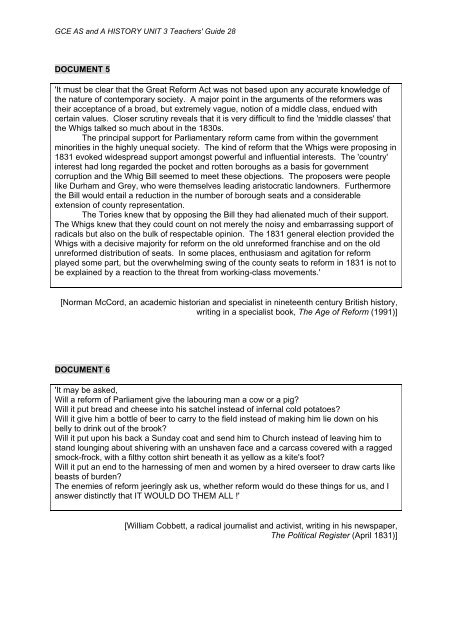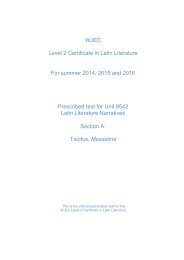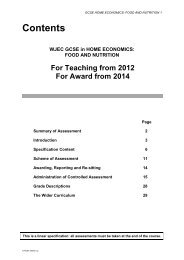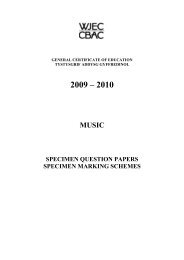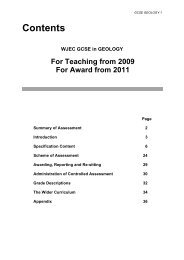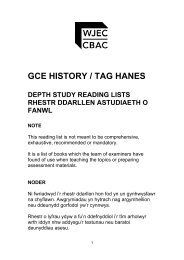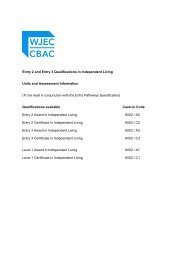GCE History Teachers' Guide - Unit 3 - WJEC
GCE History Teachers' Guide - Unit 3 - WJEC
GCE History Teachers' Guide - Unit 3 - WJEC
You also want an ePaper? Increase the reach of your titles
YUMPU automatically turns print PDFs into web optimized ePapers that Google loves.
<strong>GCE</strong> AS and A HISTORY UNIT 3 <strong>Teachers'</strong> <strong>Guide</strong> 28<br />
DOCUMENT 5<br />
'It must be clear that the Great Reform Act was not based upon any accurate knowledge of<br />
the nature of contemporary society. A major point in the arguments of the reformers was<br />
their acceptance of a broad, but extremely vague, notion of a middle class, endued with<br />
certain values. Closer scrutiny reveals that it is very difficult to find the 'middle classes' that<br />
the Whigs talked so much about in the 1830s.<br />
The principal support for Parliamentary reform came from within the government<br />
minorities in the highly unequal society. The kind of reform that the Whigs were proposing in<br />
1831 evoked widespread support amongst powerful and influential interests. The 'country'<br />
interest had long regarded the pocket and rotten boroughs as a basis for government<br />
corruption and the Whig Bill seemed to meet these objections. The proposers were people<br />
like Durham and Grey, who were themselves leading aristocratic landowners. Furthermore<br />
the Bill would entail a reduction in the number of borough seats and a considerable<br />
extension of county representation.<br />
The Tories knew that by opposing the Bill they had alienated much of their support.<br />
The Whigs knew that they could count on not merely the noisy and embarrassing support of<br />
radicals but also on the bulk of respectable opinion. The 1831 general election provided the<br />
Whigs with a decisive majority for reform on the old unreformed franchise and on the old<br />
unreformed distribution of seats. In some places, enthusiasm and agitation for reform<br />
played some part, but the overwhelming swing of the county seats to reform in 1831 is not to<br />
be explained by a reaction to the threat from working-class movements.'<br />
[Norman McCord, an academic historian and specialist in nineteenth century British history,<br />
writing in a specialist book, The Age of Reform (1991)]<br />
DOCUMENT 6<br />
'It may be asked,<br />
Will a reform of Parliament give the labouring man a cow or a pig?<br />
Will it put bread and cheese into his satchel instead of infernal cold potatoes?<br />
Will it give him a bottle of beer to carry to the field instead of making him lie down on his<br />
belly to drink out of the brook?<br />
Will it put upon his back a Sunday coat and send him to Church instead of leaving him to<br />
stand lounging about shivering with an unshaven face and a carcass covered with a ragged<br />
smock-frock, with a filthy cotton shirt beneath it as yellow as a kite's foot?<br />
Will it put an end to the harnessing of men and women by a hired overseer to draw carts like<br />
beasts of burden?<br />
The enemies of reform jeeringly ask us, whether reform would do these things for us, and I<br />
answer distinctly that IT WOULD DO THEM ALL !'<br />
[William Cobbett, a radical journalist and activist, writing in his newspaper,<br />
The Political Register (April 1831)]


